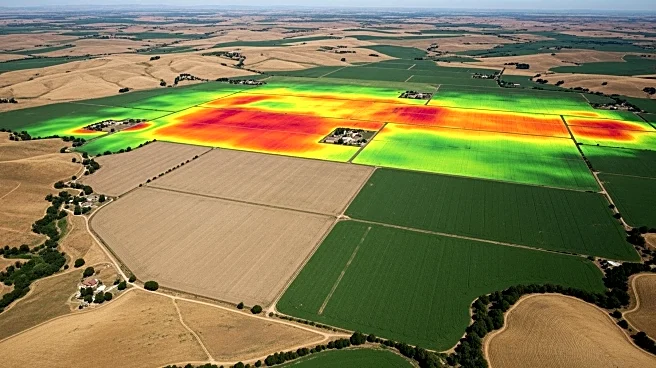What's Happening?
Researchers from San Diego State University are conducting a study to map rural heat in California's Imperial Valley, aiming to protect farmworkers from extreme temperatures. The region, known for its
agricultural productivity, experiences dangerously high temperatures due to climate change, posing health risks to farmworkers. The study involves collecting data from 300 farmworkers using body sensors to measure core body temperature and heart rate, alongside environmental monitors that track temperature, humidity, and other factors. The research seeks to understand how heat stress varies with different crops, seasons, and work conditions, and to identify rural heat islands where temperatures are particularly extreme.
Why It's Important?
The study is crucial as it addresses the health and safety of farmworkers, a vulnerable group facing increased risks due to rising temperatures. The findings could lead to better protective measures and policies, ensuring safer working conditions. The research highlights the need for more frequent rest breaks and improved enforcement of heat-related safety regulations. As the Imperial Valley is a major agricultural hub, producing a significant portion of the nation's winter vegetables, safeguarding the health of its workforce is vital for maintaining agricultural productivity and economic stability.
What's Next?
The researchers plan to expand their study to California's Central Valley and other parts of the Southwest, including Yuma, Arizona. They aim to continue analyzing data to recommend effective interventions and policy changes. The study's outcomes could influence state and federal regulations on farmworker safety, potentially leading to stricter enforcement of heat-related safety measures. The research may also prompt agricultural businesses to adopt new practices to mitigate heat stress, such as altering work schedules or improving access to cooling resources.
Beyond the Headlines
The study underscores the broader implications of climate change on labor-intensive industries and the need for adaptive strategies to protect workers. It also highlights the intersection of environmental and social justice, as many farmworkers are from marginalized communities. The research could drive discussions on the ethical responsibility of industries to safeguard their workers in the face of environmental challenges.









